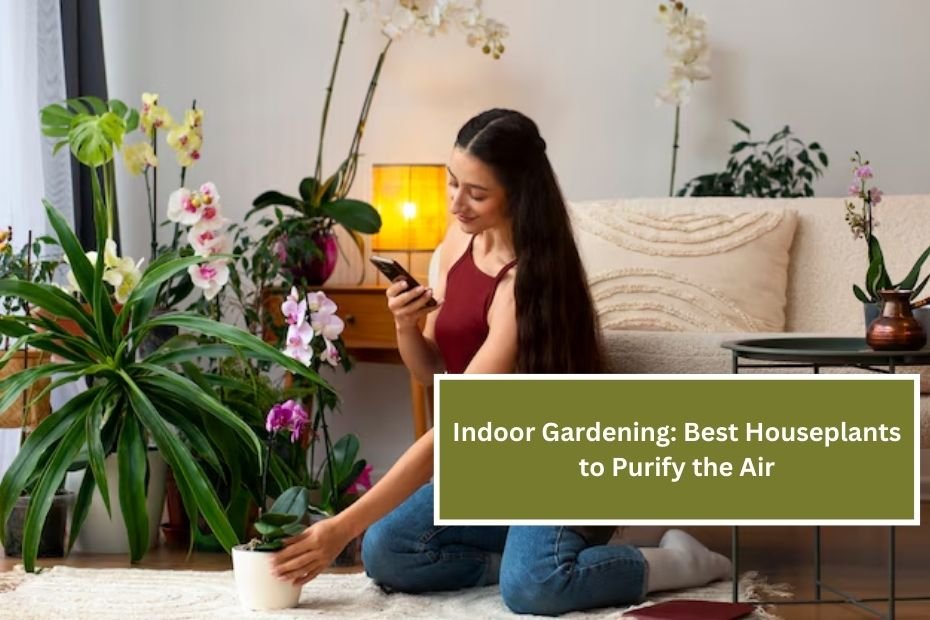Indoor gardening is not just a hobby; it’s a way to bring nature into our homes and improve our living environment. One of the most exciting aspects of indoor gardening is choosing houseplants that can purify the air. Many indoor plants can remove toxins, improve air quality, and even boost our mood. In this article, we will explore some of the best houseplants for purifying the air, how they work, and tips on caring for them.
Why Indoor Plants Are Important
Indoor plants play a vital role in enhancing our quality of life. They not only add beauty to our spaces but also provide numerous health benefits. Some key reasons to include houseplants in your indoor gardening include:
- Air Purification: Many indoor plants can absorb harmful pollutants from the air, such as formaldehyde, benzene, and trichloroethylene.
- Increased Humidity: Plants release moisture into the air, which can help alleviate dry skin, respiratory problems, and allergies.
- Stress Reduction: Being around plants can lower stress levels and enhance mood, making us feel more relaxed and comfortable in our homes.
- Enhanced Creativity and Productivity: Studies have shown that having plants in our environment can boost creativity and productivity.
Best Houseplants to Purify the Air
Here’s a list of some of the best houseplants known for their air-purifying abilities:
1. Spider Plant (Chlorophytum comosum)
The spider plant is an easy-to-care-for houseplant that thrives in indirect sunlight. It has long, arching leaves with green and white stripes. This plant is effective in removing pollutants like formaldehyde and xylene.
Care Tips:
- Light: Bright, indirect sunlight.
- Water: Water when the top inch of soil is dry.
- Humidity: Prefers moderate humidity.
2. Peace Lily (Spathiphyllum spp.)
The peace lily is a beautiful flowering plant that can bloom even in low light conditions. It is known for its ability to remove ammonia, benzene, and formaldehyde from the air.
Care Tips:
- Light: Low to bright indirect light.
- Water: Keep the soil moist but not soggy.
- Humidity: Enjoys higher humidity levels.
3. Boston Fern (Nephrolepis exaltata)
The Boston fern is a lush, leafy plant that is excellent at removing formaldehyde and other toxins. It adds a touch of greenery and texture to any room.
Care Tips:
- Light: Prefers indirect light.
- Water: Keep the soil consistently moist.
- Humidity: Thrives in high humidity, so consider misting it regularly.
4. Areca Palm (Dypsis lutescens)
The areca palm is a popular indoor plant that can grow tall and add a tropical feel to your space. It is known for its ability to humidify the air and filter out toxins.
Care Tips:
- Light: Bright, indirect sunlight.
- Water: Allow the soil to dry slightly between waterings.
- Humidity: Prefers humid environments.
5. Rubber Plant (Ficus elastica)
The rubber plant is an attractive option with its large, glossy leaves. It is effective in removing toxins like formaldehyde and is relatively low maintenance.
Care Tips:
- Light: Bright, indirect light.
- Water: Water when the top inch of soil is dry.
- Humidity: Moderate humidity is ideal.
6. Snake Plant (Sansevieria trifasciata)
Also known as mother-in-law’s tongue, the snake plant is one of the most resilient houseplants. It can survive in low light and is excellent at removing toxins from the air.
Care Tips:
- Light: Tolerates low light but prefers bright, indirect sunlight.
- Water: Allow the soil to dry completely between waterings.
- Humidity: Very adaptable to various humidity levels.
7. Pothos (Epipremnum aureum)
Pothos is a trailing vine that is perfect for hanging baskets or shelves. It is known for its ability to filter out formaldehyde, benzene, and xylene.
Care Tips:
- Light: Low to bright indirect light.
- Water: Water when the top inch of soil is dry.
- Humidity: Adapts well to different humidity levels.
8. Dracaena (Dracaena spp.)
Dracaena comes in various species, each with unique foliage. This plant is known to remove pollutants like formaldehyde and benzene effectively.
Care Tips:
- Light: Prefers bright, indirect sunlight.
- Water: Allow the top inch of soil to dry between waterings.
- Humidity: Thrives in moderate humidity.
9. Bamboo Palm (Chamaedorea seifrizii)
The bamboo palm is a beautiful plant that can reach a height of several feet. It is effective in filtering out benzene and formaldehyde.
Care Tips:
- Light: Prefers bright, indirect light.
- Water: Keep the soil moist but not soggy.
- Humidity: Enjoys humid environments.
10. Chinese Evergreen (Aglaonema spp.)
Chinese evergreen is a hardy plant that can tolerate low light and neglect. It is known for its ability to remove toxins like formaldehyde and benzene.
Care Tips:
- Light: Low to bright indirect light.
- Water: Water when the top inch of soil is dry.
- Humidity: Prefers moderate humidity but can adapt.
Caring for Your Indoor Plants
To ensure that your houseplants thrive and continue to purify the air, follow these general care tips:
- Light Requirements: Understand the light needs of each plant. Some prefer bright light, while others thrive in low light.
- Watering: Overwatering is a common mistake. Always check the soil moisture before watering. It’s better to underwater than overwater.
- Soil Type: Use well-draining potting soil. Many plants benefit from a mix of potting soil and perlite or sand for better drainage.
- Humidity: Most indoor plants prefer humidity. Consider misting them or placing a humidifier nearby, especially in dry seasons.
- Fertilizing: Feed your plants with a balanced fertilizer during the growing season (spring and summer) to provide necessary nutrients.
Conclusion
Indoor gardening can greatly enhance your living space while improving air quality. By choosing the right houseplants, you can create a healthy and inviting atmosphere in your home. The plants mentioned in this article, such as the spider plant, peace lily, and snake plant, are not only beautiful but also effective at purifying the air.
Remember that caring for indoor plants is a rewarding experience that requires attention and love. By providing the right conditions and care, your houseplants will thrive and continue to purify the air, contributing to a healthier and happier home. So, start your indoor gardening journey today, and enjoy the benefits that these green companions bring to your life!

